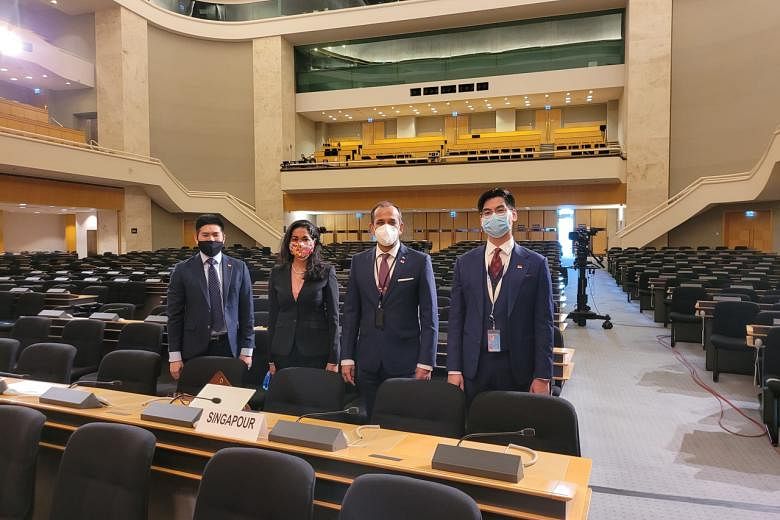SINGAPORE - Singapore takes a pragmatic approach to human rights, and by doing so, it aims to achieve two things: tangible outcomes while adhering to the rule of law; and a balance between the interests of the individual and the broader needs of society.
In this process, it has had to make difficult policy decisions as a small, multiracial and multi-religious society, said Ambassador-at-Large Chan Heng Chee on Wednesday (May 12) during a routine review of Singapore's human rights record by the United Nations.
"We strive to achieve better outcomes for our people in a manner that reflects our national context and realities. Forging a common national identity while maintaining racial and social harmony is therefore of paramount importance."
Professor Chan added that Singapore, like the rest of the world, has been hit by the pandemic, leading to the country's worst recession since its independence in 1965.
This is why it took swift measures to cushion its population, especially the low-income and the vulnerable, from the worst of the impact, she said.
"Given the long-term, structural challenges, we are taking measures to emerge stronger and better in the post-Covid-19 world - by strengthening our social compact, and building a more resilient and sustainable home for our people."
The Universal Periodic Review (UPR) looks at the human rights records of all 193 UN member states every five years. Singapore's 20-page report submitted to the UN in January covered a wide range of topics, including the country's efforts to advance migrant worker well-being and protect women from discrimination.
The report is usually discussed in person at the UN Human Rights Council in Geneva. During the process, other member states can pose questions or make recommendations to the country under review.
Singapore's participation this year was in hybrid format, with the permanent representative of Singapore to the United Nations Office in Geneva, Ambassador Umej Bhatia, and his team attending there, and Prof Chan joining virtually from Singapore.
Eliminating racial discrimination
Over a three-hour session, Prof Chan outlined Singapore's approach to promoting and protecting human rights.
She noted that Singapore ratified the International Convention on the Elimination of All Forms of Racial Discrimination in 2017, which was a recommendation made at its second UPR in 2016.
"This underscores Singapore's unwavering commitment to work towards a society free from racial discrimination, and in line with UN Sustainable Development Goal 10 on reducing inequality," she said. "While Singapore's multiracial social fabric has been strong, we must not be complacent."
Social policies and gender equality
The Government has increased grants to help more Singaporeans acquire their own homes, paying special attention to low-income families. It has also invested significantly in early childhood education.
"We will continue to work hard to preserve social mobility, so that every Singaporean has a good education and a fair shot at success, regardless of their background. This is fundamental to our meritocratic society," she said.
She stressed the importance of lifelong learning and the need to prepare Singaporeans to cope with structural economic shifts through the SkillsFuture programme.
More social services and social protections have been introduced to support the vulnerable, she said, citing cash supplements to lower wage workers and the elderly; and the SG Digital Office to drive digital adoption.
"We have also enhanced access to quality and affordable care for older persons, including measures that enable them to age comfortably within their communities."
Describing Singapore's efforts to eliminate discrimination against women and enhance gender equality, she cited a series of national conversations on women's development, launched in September 2020.
These conversations will result in a White Paper to be submitted to Parliament in the second half of this year.
Following Wednesday's UPR, an outcome report will be prepared and Singapore may choose to accept the recommendations made.
After its first review in 2011, Singapore supported, in whole or in part, 84 of the 112 recommendations made. And it did so for 125 out of 236 recommendations after the second review in 2016.
In his remarks on Wednesday, Mr Bhatia said Singapore remains committed to the regular review of its policies and approaches to ensure that no one is left behind.
"Singapore has focused on achieving tangible outcomes for our people, while respecting our human rights obligations. Policymaking, however, does not exist in a vacuum and is informed by evolving societal perspectives and circumstances," he said.
"It requires maintaining a dynamic and delicate balance between different segments of our society, while managing demands to privilege one group over others."


